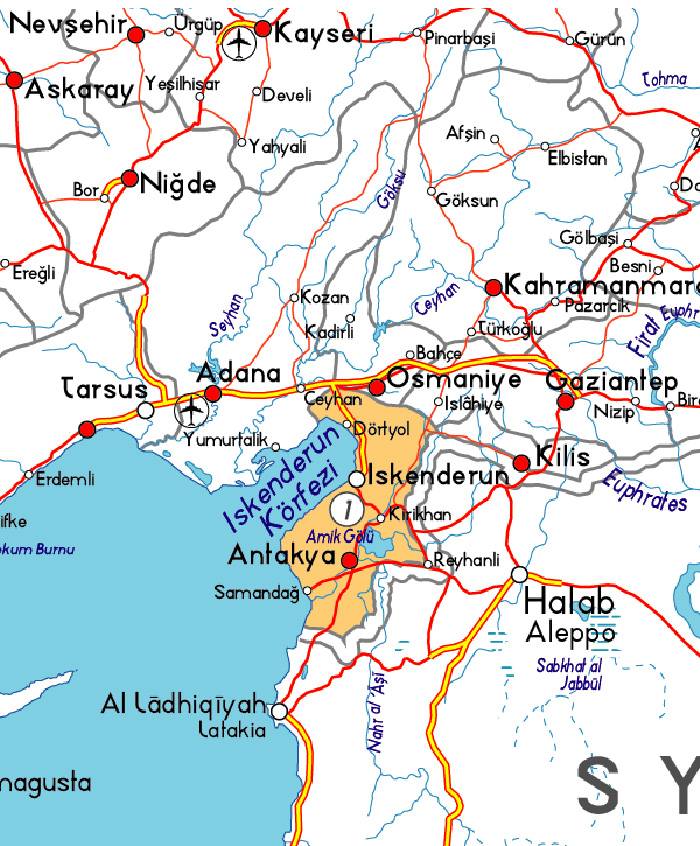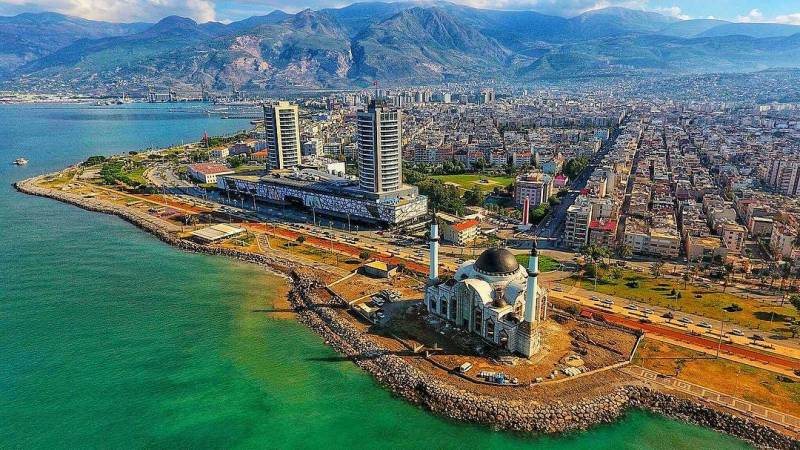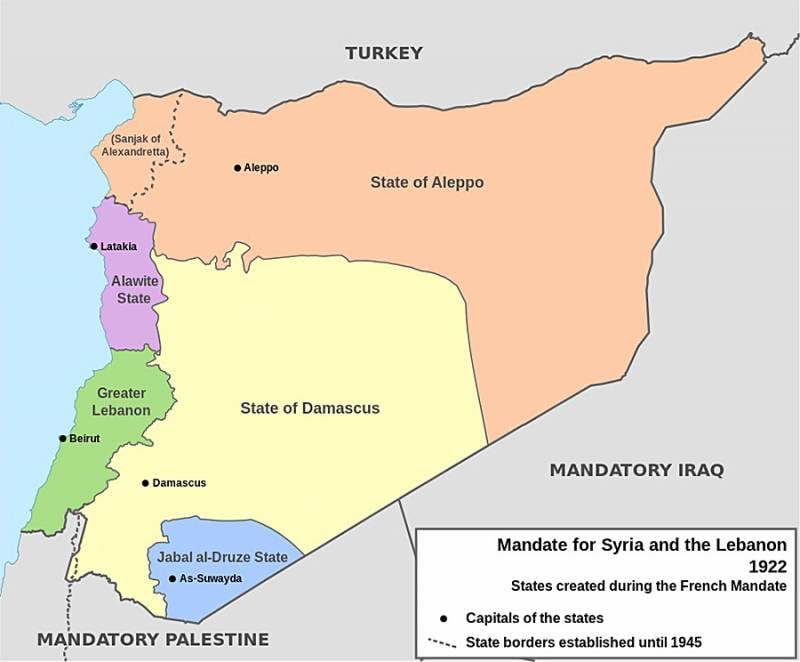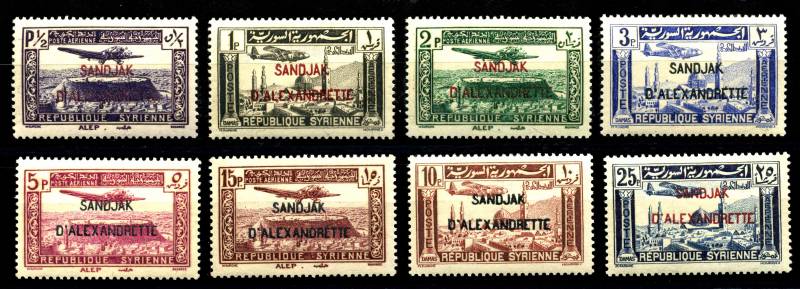How the Turks in 1939 put a “circumcision” on Syria
Mediterranean angle
23 June 1939 of the year Alexandretti Sandzak in northwestern Syria entered Turkish troops. The entire territory of Syria after the collapse of the Ottoman Empire was at that time under the French mandate of the League of Nations, which meant only a somewhat veiled colonial dependence. However, the region covers an area of 4700 sq. km, where only a third of the population were Turks, was captured with little or no resistance. France simply surrendered, and most likely, “sold” Alexandretta to the Turks.
Already by the autumn of 1940, Armenians, Arabs, French, Kurds, Greeks, Druze were deported or emigrated from Sandzak. Thus, Turkey received a strategic region in the Mediterranean from the “filing” of the UK, to the ports of which (Iskenderun, Dortiel) and to the nearby ports of Ceyhan and Yumurtalik were laid in 1970-X and in the beginning 2000-high oil pipelines from Iraqi Kurdistan, respectively, from Syrian Northeast and from former Soviet Azerbaijan. By the way, Turkey at the end of 30-s was laying claim to the main Syrian port - Latakia, but then it was possible to “dissuade” it ...
Subsequently, with repeated calls to “liberate Alexandretta,” not only Hafez Assad, but also other Arab leaders, Muammar Gaddafi, Gamal Abdel Nasser and Saddam Hussein, spoke. According to French sources (2018), the Syrian "non-Islamic" opposition accuses the current Syrian leadership, among other things, of refusing to return the region. By the way, there is a considerable, perhaps the main "merit" of the Soviet leadership, who has always discouraged Damascus from reanimation of this issue.
However, this, of course, was connected primarily with the pragmatic course of Moscow towards Turkey in the post-Stalin period. In addition, we must not forget that the USSR was the first country to go for recognition as an independent Turkish Republic. In addition, even the Stalinist leadership considered it necessary to maintain loyalty towards Turkey, which had not entered World War II on the side of Germany.
Such measures on the part of Moscow as sudden discontinuations of support for the Turkish Communist Party and Kurdish partisans, or outright distancing from foreign groups of Armenian avengers for the 1915-21 genocide, were very characteristic in this sense. It should be recalled that the main one, the “Secret Armenian Army ASALA,” is still in effect, and in Turkey, of course, is recognized as terrorist.
In this connection, we present the point of view of the Russian historian-arabist A.V. Suleimenova:
Who will keep the old scores
It should be recalled that already at the end of 40-x and the beginning of 50-s, the Syrian leadership repeatedly stated that France arbitrarily ordered a part of Syrian territory, therefore either Paris should reconsider such a decision, or Syria will independently seek reunification with this region. But Paris, with the support of London and Washington, and then Moscow, managed to “muffle” such plans of Damascus.
"... the problem," notes A. Suleimenov, "remains relevant even today, since Syria de jure did not recognize Sandjak for Turkey. Up until the middle of the 60s, and especially during the period when Syria was still part of the notorious SAR, she regularly demanded compensation from France for the withdrawal of this region in favor of Turkey. ”
Even on the latest Syrian maps, the territory of Alexandretta (since 1940, this is the province of Hatay) is colored in the same color with the rest of the SAR territory, and the current Syrian-Turkish border here is marked as temporary. However, over the past decades Syria has avoided openly raising the question of the need to resolve this problem as soon as possible with Turkey. For since the middle of 1967, when Israel defeated the Arabs in the Six-Day War, an even more important question of the return of the Golan Heights rose to the agenda.
After Recep Erdogan and Bashar Asad exchanged visits in 2004, there was a decrease in tensions around this issue. The Syrian government already in 2005 year stated that it has no claims on Turkish sovereignty in this area. But this, despite Ankara’s repeated proposals, is still not legally enforced.
The chronology of the problem, in brief, is as follows: in the summer of 1936, Ankara, referring to the imminent termination of the French mandate in Syria, filed claims to Sandjak Alexandretta. Britain supported the Turkish claims, seeking to weaken the position of France in the region and soon achieved this. In the face of "friendship" not only in Berlin, but also London and Ankara against Paris, the French leadership agreed to negotiations. And in the fall of 1938, Turkey introduces its troops into the province of Hatay, and with the consent of France.
Indeed, before us is the Mediterranean analogue of the “solution” of the Sudeten Question by the rejection of the Czechoslovak margins in favor of Germany. Or maybe the point is that Europe at that time was too busy with the problems of the German Anschluss and annexation. But we will continue. 21 May 1939 was signed a mutual assistance agreement between the UK, France and Turkey without a validity period. But Turkey did not fulfill its obligations under the treaty, proclaiming neutrality during the Second World War (and only 23 February 1945 entered the war against Germany, clearly to “have time” with full membership in the UN).
Sold semi-colony
23 June 1939 was finally signed the Turkish-French agreement on the transfer to Turkey of the designated region of French Syria. And already in 1940, Turkey initiated negotiations with Iraq on the possibility of building an oil pipeline from Kirkuk to Alexandrette, and the project was immediately supported by Germany and Italy.
The allies of the Anti-Comintern Pact did not hide their interest in finally getting rid of the crucial role of London and Paris in the transit of Middle Eastern oil through the ports of British Palestine and the French Levant. In addition, we must not forget that by that time the Second World War was already under way, on the western front - “strange”, but on a strategic scale, quite real.
However, the “pro-British” Iraqi Prime Minister Nuri Said reasonably suspected in the project, among other things, Ankara’s new attempt to subdue or even reject Iraqi Kurdistan from Baghdad. And the negotiations, barely beginning, were interrupted. In the future, the new (after 1958) Iraqi authorities agreed with the project, as they were interested in increasing the export of Iraqi oil and in building relations with Turkey. This, by the way, was primarily due to its revenues from the transit of North Iraqi oil. Isn't it true that the notorious “Turkish Stream” is immediately recalled.

So far, there is no reason to believe that the B. Assad government will return, at least in foreign policy propaganda, to the question of Khatay. But this is quite possible in the case of more active actions of Turkey in the separation of the "oil transit" Syrian North. In any case, the Khatai region literally hangs over the main Syrian port of Latakia, and in the event of a sharp aggravation of the Syrian-Turkish relations, Lattakia may well be blocked.
It remains to be recalled that even in 1957, the Turkish military strike was planned specifically against Latakia from nearby Hatay, but the Soviet leadership threatened Ankara with "inevitable consequences" in the event of its aggression against Syria. Meanwhile, two decades earlier, in the 1936 year, Ankara included in its claims against Syria and the port of Latakia with the adjacent area adjacent to Sandzak Alexandretta. Although in London and Paris, they were able to reason with Ankara. But forever? ..



Information